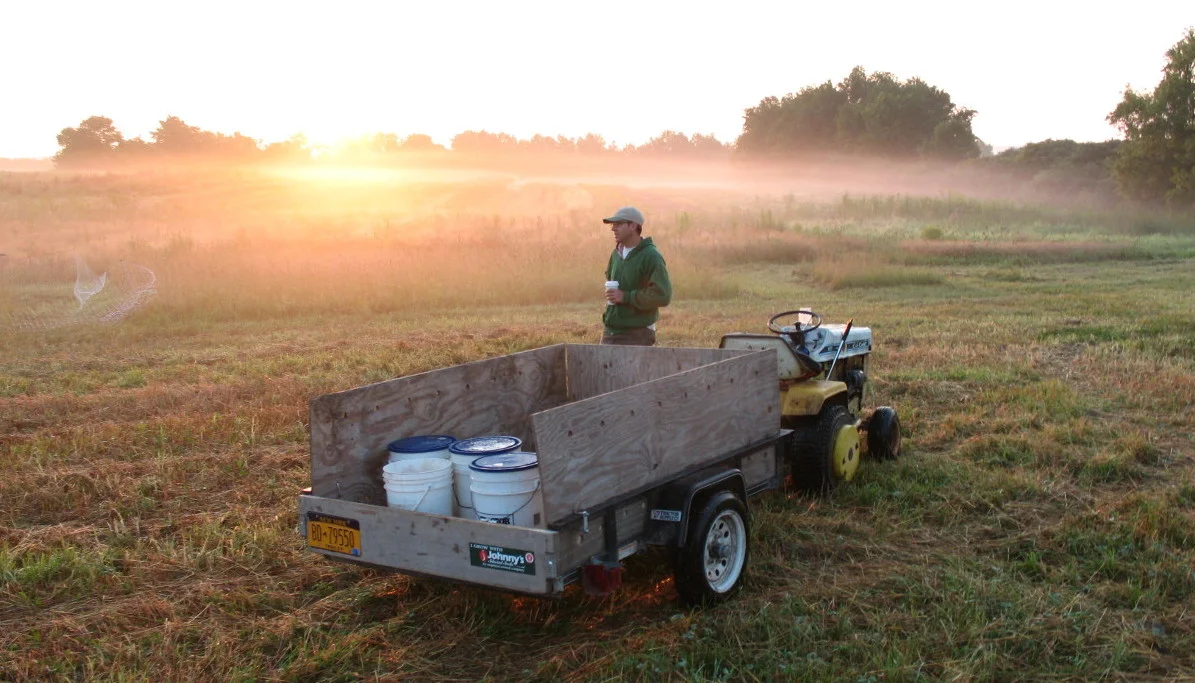The Intersection of Farming and Health Insurance
/We normally stick to nuts and bolts sort of things in our blog, but this week we veer off course to the topic most on our minds this winter—health care!
[As a heads-up, we are now going to do something we never do in our blog, which is talk a bit about politics. And because we know some of you want some places in your life—like your farm blog—that don’t hit on politics, please skip to next week’s blog which will be about happier things like seedlings—we won’t be offended! Here’s an internet picture of a kitten and owl snuggling to keep you going till next time...]
As relatively young farmers who eat their veggies and get plenty of exercise, we’ve been lucky to be healthy over the years, with a few exceptions these past 18 months, culminating in Matt’s evil gallbladder getting the axe this winter. Matt spent most of our off season in considerable pain, and while he’s healing well, this whole thing has us ruminating hard on what’s become the biggest financial elephant in our farm plan—access to affordable health insurance.
The ACA isn’t perfect, as our credit card full of deductibles shows. However, the cost of not having health insurance is exponentially greater for us—if we hadn’t had a policy through the ACA this winter, we would have had to sell the farm to cover the cost of Matt’s gallbladder surgery. As farmers, we know we aren’t alone in this challenge, and since we have this blog to talk about things that matter to us on the farm, we thought we’d hit on our three biggest challenges as small farmers dealing with our health care system.
A) It’s actually super hard to find coverage if you are self-employed, and it’s way more expensive than you would think.
Before the advent of the ACA, as a small business owner it was nearly impossible to find an insurer willing to cover us, because apparently in the eyes of health insurance agencies, anyone crazy enough to work for themselves must also be an unhinged thrill seeker prone to skydiving, gator wrestling, and drag racing, and thus a poor risk. Back in 2007 in NH, the lowest monthly premium we could find ran $3600 for two adults, and we were told we were lucky to have any access at all because of how high risk they consider self-employed people! Needless to say, we didn’t have insurance at that price point.
Frankly, we’d happily pay the cost of an iPhone each year for insurance. Heck, at this point, we’d happily pay $500 a month, because from our experience we know that without the regulation of a system like the ACA pretty much any insurance plan that would accept crazy self-employed people like us generally runs 50% higher than our farm mortgage.
The challenge of finding underwriting compounded with the cost of individual plans and the cost of health care in general gets particularly hard when your business centers around raising a product that frankly doesn’t have much street value (though we know our veggies have a lot of intrinsic value!). We see the cost of farm inputs grow by 5 to 10% each year and the weather seems trickier each year leading to higher potential for crop losses, leaving us farmers trying to figure out how we can juggle all these rising input costs while keeping our veggies priced so that you all can afford them (since we know that some of these same challenges are hitting our great customers!).
B) Not knowing how much insurance will cost makes accurate business and farm planning effectively impossible.
As farmers, we are actually in a field where accidents happen, and as humans, we are in the process of getting older each year (though seasons like last summer feel like they age us three or four years at a pop!), so we are highly conscious that we need to find a way to pay into the system for future health care coverage. And as this winter’s experience reiterated, it would be foolhardy to risk going without when even minor surgeries cost so much.
When we started Hartwood Farm in 2012, knowing affordable insurance was in the pipeline was a major factor in helping us feel like we could take the plunge. Keeping health care costs under 20% of our income is essential to our farm and household operating budget. Our initial sense crunching early numbers off the Repeal/Replace plan in Congress now is that we look to see a premium cost increase to 33% of our total household income (with who knows what sort of deductible) over the 9 to 12% (including deductible) that we pay currently under the ACA.
Not knowing if we will be returning to significantly more expensive health insurance leaves us uncertain if we can make the capital and infrastructure upgrades the farm needs. Since some of these upgrades come about as the result of a year or more of planning and six to eight months of loan applications, holding off to see how things work out for the ACA now could set us back and make for more harrowing growing for two seasons to come. (Though we are actually biting the bullet and taking on some extra risk to invest in some of our needed equipment, hoping that health care works out to a less crazy total price tag!)
C) It’s incredibly anxiety producing, in a field where there is already enough anxiety.
Farming is all about planning ahead for potential challenges and disaster, and working proactively to mitigate those risks before they happen. We do this through planning for crop redundancies, buying insurance to protect our structures and assets from extreme weather events, growing crops in a food-safe manner, and creating a healthy workplace with workers’ compensation insurance to cover our staff. It’s frustrating that we can do so much to insure and protect the farm, but without some sort of regulated health care system, we potentially are rendered helpless by higher prices or lack of policies to take the steps we need to insure the farmers’ physical health.
Facing a new growing season, we should be worried about potential drought or flooding or new plant diseases, because all of those challenges have been building each year. But frankly, what scares us most this winter is not anything in the fields, but everything happening down in D.C. as they debate the shape of our (and countless other farmers' and small business owners') future access to affordable health care.
[And since you made it this far, here’s a picture of a shiny sunset after rain, since so much of handling challenges while farming is remaining determined and hopeful that the rain will eventually pass by and we can get back to work...]


